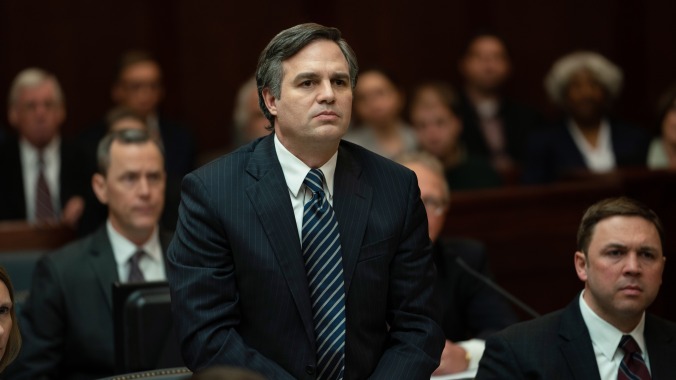What the hell is Todd Haynes doing behind the camera of generic docudrama Dark Waters?

Some filmmakers strive to balance their purely artistic impulses with pragmatic commercial considerations via a rough policy of “one for me, one for them.” Gus Van Sant springs instantly to mind—for every offbeat, uncompromising project like Gerry or Elephant, there’s a more audience-friendly Good Will Hunting or Finding Forrester. Van Sant’s Portland neighbor, Todd Haynes, appears to have settled upon a different ratio: eight for me, okay, fine, maybe one for them. After nearly 30 years devoted exclusively to his idiosyncratic muse, he’s finally directed a movie that virtually anybody could have made, and that numerous others—including Van Sant, actually—already have. Dark Waters would likely have been a forgettable mediocrity in anybody’s hands, given its fact-based, muckraking limitations. Coming from the visionary who gave us Safe, Far From Heaven, I’m Not There, and Carol, it’s a crushing disappointment.
The waters in question can be found in Parkersburg, West Virginia, near one of the chemical plants at which DuPont produced the non-adhesive coating used in Teflon products. When cattle start dying and residents’ teeth turn black (around 1998), the victims turn to Rob Bilott (Mark Ruffalo), a big-city lawyer who originally hails from that region, unaware and unconcerned that Bilott’s job involves defending large corporations from accusations of malfeasance. Once DuPont’s head honcho (Victor Garber) shifts from friendly deflection to angry threats, Bilott dives into the case head-first; it winds up occupying much of his time for the next two decades, as he organizes a huge class-action lawsuit and contends with DuPont’s increasingly underhanded efforts to elude responsibility for knowingly poisoning people. The story teeters repeatedly from triumph to the edge of despair and back again, culminating in a landmark resolution just two years ago (which is presumably why we’re seeing this docudrama now).
Dark Waters was adapted from a New York Times Magazine feature story by Nathaniel Rich, entitled “The Lawyer Who Became DuPont’s Worst Nightmare.” That’s where it belonged. Dramatizing a decade-spanning legal saga without embracing Hollywood’s noble-crusader template is a nearly impossible task, and this film unfolds exactly like every other such movie you’ve ever seen, from North Country to Veronica Guerin. (If you don’t remember either of those, well, there’s a reason.) Erin Brockovich is arguably its closest cousin, but Robert Bilott, while an admirable guy, lacks any of the unorthodox qualities that landed Julia Roberts an Oscar. Ruffalo plays him as quietly tenacious, which is far more rewarding to read about than it is to watch in low-key action. Dark Waters never once deviates from the trajectory that one would expect, offering no arresting or unexpected details. A company behaved abominably in pursuit of profit. It was eventually forced to answer for its actions. The end.
Haynes has said that he took on this project out of genuine outrage, and that makes perfect sense—anyone of conscience would feel similarly. To say that it doesn’t play to his strengths, however, would be an understatement. The director’s formal intelligence makes a fleeting appearance during the film’s prologue, set in 1975; a group of kids goes skinny-dipping in the reservoir that we’ll later learn is contaminated by perfluorooctanoic acid (PFOA, also known as C8), and shots of their car driving along a deserted backroad en route, and of their limbs splashing in the murky water, positively thrum with inchoate menace. That’s the man who made Safe. Everything that follows, however, looks utterly generic, and the conventional context apparently infected Haynes in much the same way that PFOA infected the good people of Parkersburg. He plays John Denver’s “Take Me Home, Country Roads” over a sequence of Bilott driving down country roads in his hometown. He willingly shoots Zaillian’s clichéd “Eureka!” moment, in which Bilott realizes what’s happening after glancing at one of his little kids’ picture books, Funny Teeth. He allows Bilott’s wife (Anne Hathaway, squandered) to hiss, “Please don’t talk to me like I’m the wife,” even though Dark Waters treats her as “the wife” throughout, giving her nothing to do except complain that Bilott’s obsession with the case is ruining their lives. One could credibly argue that Hayne’s earned the right to coast a little once in a while, but sitting through the downgrade is still dispiriting.